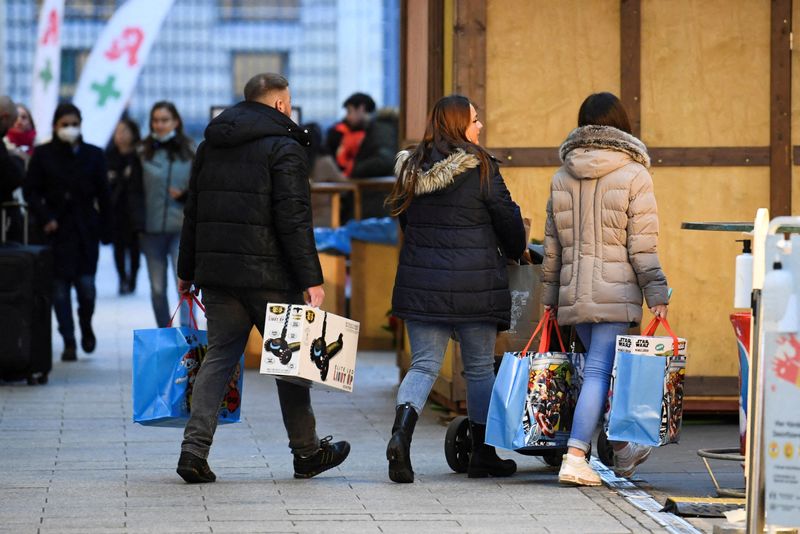By Zuzanna Szymanska
BERLIN (Reuters) -A big fall in German retail sales as COVID-19 curbs kept people out of shops over the usually busy Christmas period underlined its flagging economic recovery, but signs that jobs and production are picking up suggested a brighter start to 2022.
Data on Tuesday showed retail sales tumbled 5.5% in December in real terms, a much steeper decline than the 1.4% forecast by a Reuters poll of economists.
Sales of textiles, clothing, shoes and leather goods were hit especially hard by a requirement that customers in non-essential shops show proof of COVID-19 vaccination or recovery, part of measures imposed to halt the Omicron wave of the virus.
"The usual end-of-year fireworks clearly backfired this time," said Alexander Krueger, an economist at Hauck Aufhaeuser Lampe Privatbank. "The new restrictions are a big part of this. Many people are probably also cutting back on spending as they are afraid of high energy costs."
Surveys of Germany's labour market and manufacturing sector struck a more positive note, suggesting that producers were starting to crank up output as supply shortages ease.
COVID measures and supply chain problems that have affected Germany's large auto industry contributed to a final quarter contraction of 0.7% in Europe's biggest economy compared to Q3 and kept growth to 2.8% in all of 2021.
The German economy underperformed the wider euro zone, and notably its second-biggest economy, France, which grew 7% last year, the most since 1969, data on Friday and Monday showed.
France largely lifted pandemic-related restrictions towards mid-year. It has reported 3,489 infections per 100,000 people over the last seven days, compared with 1,285 in Germany.
Worries about rising prices, especially for energy, among inflation-wary Germans are likely to hit retailers further in 2022, industry association HDE said, warning that almost 16,000 shops could disappear this year.
It said online shopping was likely to drive growth in the sector this year, expanding 13.5% compared to 1.2% for physical shops, and called for the bar to be lifted on non-essential shopping by unvaccinated people to help smaller retailers.
"This measure, which is useless in the fight against the pandemic, must finally be dropped nationwide," HDE Chief Executive Stefan Genth said in a statement.
About a quarter of the German population is not vaccinated against COVID-19.
SALES STABLE ON YEAR
Retail sales is a volatile indicator and often subject to revisions.
The Federal Statistics Office said sales figures adjusted for prices remained stable on the year, compared with an average Reuters poll forecast for an increase of 1.1% compared with December 2020.
"The December decline is probably related to the fact many retail outlets have started asking for proof of COVID-19 vaccination or recovery, and the impact of seasonal adjustment due to Christmas," it said in a statement.

Compared with February 2020, the month before the coronavirus crisis hit Germany, retail sales in December 2021 were up 0.7%.
Recent surveys have suggested morale is improving among German businesses as supply bottlenecks ease.